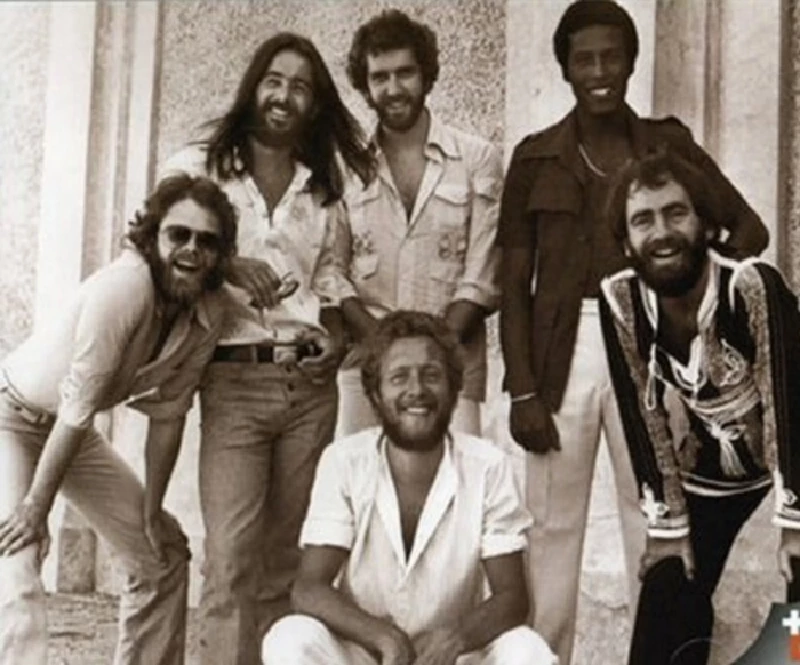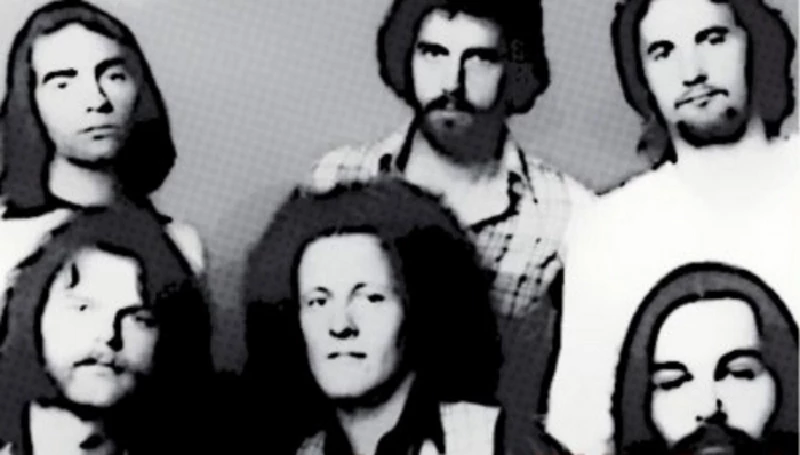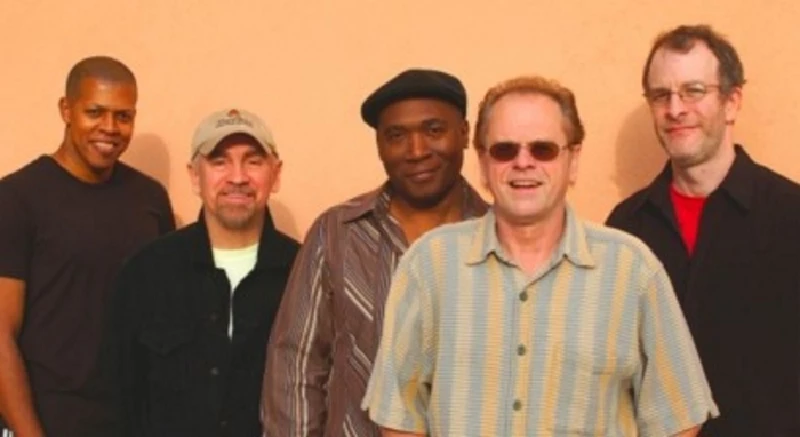Average White Band - Average White Band
by Benjamin Howarth
published: 28 / 7 / 2009

intro
Ben Howarth examines the career of 70s funk and soul outfit the Average White Band, who have just had twelve of their albums re-released on four double CD packages
The Average White Band were, of course, nothing of the sort. They appropriated, in form and content, music that has remained distinctively ‘black’ - funk and soul. And why not? After all, the Rolling Stones and most of their 60s peers can thank black musical tradition for their entire output. But (with the exception of the occasional white rapper and of ska, which allied with punk to lucrative effect twice, in the UK in the late 70s/early 80s and then in California during the 90s), distinctively black musical styles have tended to stay just that. Perhaps that is the reason why, despite their success and obvious musical gifts, the Average White Band have never quite been elevated to the status of true greats by anyone other than hardcore fans. As, in their reformed incarnation they tour the UK next month, I suspect they will be considered a "good night out" rather than a "legendary performance" by many of the people there. And yet, that sells them short. The Average White Band were, at their heart, a pop band seeking hit singles. But they offered variety and skill, and their work stands up to modern-day reappraisal more robustly than many of their contemporaries, some of them routinely subject to the drooling of critics. The band formed out of the ashes of a series of Scottish soul and jazz groups, nailing a hard and sharp funk style that they stuck to for most of their career. Their success can be nailed down to two core factors - their skilled musicianship (equally adapt at cutting focused pop singles and performing expansive live sets) and their willingness to play it straight. Others may have done, but AWB themselves never questioned their right to call themselves a funk band. Self confidence brims from their recorded output. A greatest hits is surely kicking around somewhere, and might be where the entirely uninitiated want to start, but the completist has now been furnished with the twelve albums they released before the ‘classic’ line-up disbanded in 1982. Reformed line-ups have made other albums, but over four double disc packages, we can now chart the moves of an underrated band. 'Show Your Hand' (1973), their debut album predated the band’s success - they had to move to Atlantic from MCA before soul radio stations started to take them seriously. But they had already established themselves as a respected live act, winning over crowds as Eric Clapton’s support act, and it shows. This album marks the band’s hardest set of songs, in some respects, but they still found room for the relaxed ‘Twilight Zone’. Most impressively, for a new and unheralded band, they made no concession to the rock fans that might have made up the core of the Scottish music audience. There are no stand out tracks on this album, but, as a cohesive set, it isn’t at all bad. This disc comes with a series of bonus tracks, which demonstrate the rate of progress for a band that had formed not so long before. They don’t, yet, point to the step up AWB would make with their next release. Listening to 'Average White Band' (1974), the band’s first for Atlantic and their first hit, you’d imagine it all came easily by now. (Self-titled, and with a white cover, it was inevitably nicknamed 'The White Album' by fans). But this period was probably the toughest period for the band - on the tour that followed the release of this album, two of the band suffered heroin overdoses. Drummer Robbie McIntosh tragically died, while bassist/vocalist Alan Gorrie was kept alive until the ambulances arrived.. And before its release, the band were dropped by MCA. These reissues contain two different goes at the second album, the first effort packaged as the band had hoped as ‘How Sweet Can You Get?’ (complete with a picture of a jar of honey on the cover) and then the finished album that Atlantic released. Frankly, it's hard to see what was wrong with ‘How Sweet Can You Get?’ Its slightly looser and gentler than the eventual ‘Average White Band’ album, but the songs are here, and at this point they had became a funk band with obvious hit-potential. Yet, being freed from their MCA contract was the making of the band. They were quickly snapped up by Atlantic’s Jerry Wexler, the man who had snapped up Solomon Burke, Wilson Pickett and Arethra Franklin. A seal of approval from a sage judge and a doyen of the soul genre was the hint that radio programmers and funk fans needed that AWB, despite their origins, were the real deal. But on top of that, Wexler pushed his charges further on, insisting that the tracks from ‘How Sweet Can You Get It?’ be toughened up, and that the two weakest tracks be replaced by new songs. What emerged was a master class is loose, lively funk. And in ‘Pick Up The Pieces’ and ‘Person to Person‘, the band had the hit songs they needed. (And hip-hop producers of the future had a track they could sample over and over again.) On a roll, these reissues show no sense of a band in trauma after the death of its drummer. Musically, AWB charged onwards, though with the addition of London-based drummer Steve Ferrone, they were no longer an all-white group. ‘Cut The Cake’ (1975) represents their finest work. Opening with the title track, ‘Cut The Cake’ another slice of pure funk to improve even upon the high points of their last record, they move onwards with ‘If I Ever Lose This Heaven’, a truly great pop single (bafflingly it only made it to #25 upon release, but time has treated it more kindly and it is now a disco staple) and onto ‘Cloudy’, their strongest ballad. ‘How Sweet Can You Get?’, which would have been the title-track on their aborted second MCA album reappears here. Of all the albums reissued here, ‘Cut The Cake’ is the one no record collection should be without. The winning streak continued into 1976, although by this point, some of the novelty had worn off. Sales dipped slightly and the singles stopped charting quite so consistently high. Nevertheless, ‘Soul Searching’ is almost as good as ‘Cut The Cake’, and nails the band’s two real strengths - effortless sounding funk and groovy, catchy soul. Many of the tracks here, especially the sultry ‘Queen of my Soul’, remain staples of the band’s live set. And, (after a brief, and slightly pointless detour with the 1977 album ‘Benny & Us’, a set of duets with Ben E. King - now a shadow of the man who made ‘Stand By Me’), that live show is what comes next. ‘Person To Person’ (1977), a double album, is strictly for keen fans, but epic versions of the band’s finest hours are topped off by a raucous version of ‘I Heard It Through The Grapevine’. Two bonus tracks appear here, both as good as anything on the initial release. By the time ‘Warmer Communications’ (1978) was released, the band’s popularity seemed to be on the wane. This was the last AWB album to sell enough copies to merit the award of a gold disc. But, long term fans still had plenty to rally behind. Especially magnificent is ‘Daddy’s All Gone’, a sensitive cover of a James Taylor song. The fourth double-disc set rounds up the remaining stages of the band’s career (discounting albums released after they reformed), as the band became a tad more inconsistent over three full length albums and a long EP. But, taken as a whole, there is plenty here that should entice anyone who enjoyed their better known material. ‘Feel No Fret’ (1979) was the first produced solely by the band, as they parted ways with longstanding producer Arif Martin, who had stopped working with Atlantic Records and therefore was not available for the Average White Band. There continue to be some excellent moments, but the consistency that had always been the hallmark of the Average White Band was gone. In some respects, the band obviously learned from their mistakes in time for their album, ‘Shine’ (1980). They recruited a new producer David Foster and set about adding a pop sheen to some of their strongest compositions. Four songs were recorded before the band left Atlantic, which were packaged together as an EP ('Volume VIII'). For the second time in their careers, AWB were having a second go at the same album with a new label, Arista. This time, however, they were forbidden to take the recorded songs with them. Those who prefer the rawer funk-side to the band are likely to like this album least. Fans of this album, a master class in early 80s pop-soul that outshines anything produced by the faux-soul bands that would lead the ‘British Invasion’ a few years later, might prefer to forget footballer’s wife Louise Redknapp’s limp cover of ’Let's Go Round Again’. Yet, this is an album clearly aimed more at a chart audience that remained largely unmoved, rather than the loyal fanbase. Perhaps if Atlantic hadn’t decided to challenge their former employees with the four ‘Volume VIII’ tracks, packaged now as a full length LP with five greatest hit tracks on the B-Side, new label Arista might have had more success. Later, Chaka Khan had more luck with one of these songs, “What’cha Gonna Do?’ Produced by AWB’s old ally Arif Martin, he secured a global #1 hit. The final recording of the ‘classic’ AWB line-up came with ‘Cupid’s In Fashion’(1982). It was a bit of a sorry way for them to bow out, as the band had disco producer Dan Hartman thrust upon them by Arista’s bosses - an insult to a band who still saw themselves as an authentic soul act. The band are uniformly dismissive of this album, and its hard to disagree. There is, however, some amusement to be found in the spectacular miscalculation of a record label. The band parted ways shortly after it. And there ends a remarkable flurry of activity - in less than a decade, the band had churned out reams of material, providing not just a textbook of the funk genre but the source material for countless hip-hop samples. To those of you wondering whether a simple greatest hits might not be enough, I stress the startling consistency of the band’s albums, and the fact that they tended to keep their most sophisticated musicianship and their sharpest takes on the funk genre for the songs that were not hit singles. Others may just be wondering if its time to update your vinyl copies - I strongly suspect there are many out there who have simply forgotten how much better the Average White Band were than the average. At their best, they were spectacular. Even at their worst, they were skilled and entertaining.
Picture Gallery:-


most viewed articles
current edition
Deb Googe and Cara Tivey - InterviewJack Frost - As Seen on TV
Nils Petter Molvaer - El Molino, Barcelona, 24/4/2025
John McKay - Interview
Editorial - July 2025
Robert Forster - Interview
When Rivers Meet - Waterfront, Norwich, 29/5/2025
Kruder and Dofmeister - Paral-lel 62, Barcelona, 27/4/2025
Skunk Anansie - Old Market, Brighton, 16/5/2025
Yardbirds - Des Plaines Theater, Des Plaines, 18/4/2025
previous editions
Boomtown Rats - Ten Songs That Made Me Love....Heavenly - P.U.N.K. Girl EP
Oasis - Oasis, Earl's Court, London, 1995
Loop - Loop / Godflesh - Heaven, London, 4/6/2014
Super Furry Animals - Ten Songs That Made Me Love...
Brad Elvis - Interview
Not Forgotten Girl - Interview
Serge Gainsbourg - Ten Songs That Made Me Love...
Heaven 17 - Interview
Joe Perry (Aerosmith) - Interview
most viewed reviews
current edition
Davey Woodward - Mumbo in the JumboVultures - Liz Kershaw Session 16.06.88
Billy Nomates - Metalhorse
HAIM - I Quit
Vinny Peculiar - Things Too Long Left Unsaid
Peter Doolan - I Am a Tree Rooted to the Spot and a Snake Moves Around Me,in a Circle
Pulp - More
Garbage - Let All That We Imagine Be The Light
Morcheeba - Escape The Chaos
Little Simz - Lotus
Pennyblackmusic Regular Contributors
Adrian Janes
Amanda J. Window
Andrew Twambley
Anthony Dhanendran
Benjamin Howarth
Cila Warncke
Daniel Cressey
Darren Aston
Dastardly
Dave Goodwin
Denzil Watson
Dominic B. Simpson
Eoghan Lyng
Fiona Hutchings
Harry Sherriff
Helen Tipping
Jamie Rowland
John Clarkson
Julie Cruickshank
Kimberly Bright
Lisa Torem
Maarten Schiethart